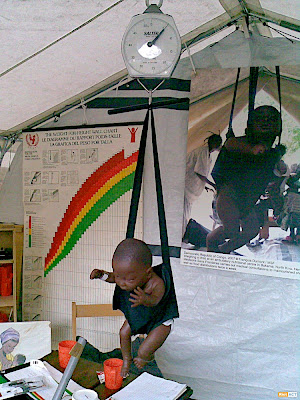
I’m not going to editorialise too much on this as other readers will be able to offer more experienced and insightful views of Medecins Sans Frontieres (MSF) and their operations. As with a regular column I write elsewhere in a world of music I perceive only dimly through inexpert eyes, I’ll give you ‘A Punter’s Perspective’.
MSF do not facilitate flight of refugees across borders. They deal exclusively with ‘internally-displaced persons’.
My earlier throw-away comment about people who are against accepting refugees to our shores, I stand by; but it’s not relevant to any discussion about the work of MSF. To quote from their literature: ‘MSF is an independent organisation for medical-humanitarian aid which provides victims of disease, natural or manmade disasters, or armed conflict, access to urgently needed medical care.
MSF also speaks out on the plight of the people it helps.’You can read more about MSF and related activities such as ‘Refugee Camp in your city’ at www.msf.org.au/refugeecamp
With the light fading on a pleasant early spring afternoon in Canberra, and just a couple of hundred metres from one of the city’s brightly-lit, plastic temples to mass consumerism, I was stopped at the entrance to the refugee camp and held there until the border guards deigned to let me in.
(Slideshow below)
‘What can you offer us to come in?’ asked the volunteer at the ‘Stop’ sign. This was no ‘charity-mugger’ spruiking for spare change or a sign-up to a charitable giving program; she was setting the scene for the camp tour.
From here, I’ll let Ruth the tour guide take over. Ruth is studying International Relations in Canberra, but she’s also served in operating theatres at refugee camps in Darfur and Pakistan.
“There’s a lot of political agenda about trying to stop the production of landmines. And then there’s a lot of work trying to de-activate them. The people who are working on that say it will take 110 years to clear up the mines that are already there; never mind if there are any more added.”
Ruth showed examples of cluster bombs that are dropped from planes with a parachute device so they don’t detonate when they land. The example mine she had looked like a cross between a tennis ball and a hacky sack.
“Children will come and pick them up to play with, and they’ll be killed. Or you might walk along and, depending on the size of the person, you might not be killed, but you could lose a leg.”
“The World Food Program does most of the work in regard to providing food distribution. MSF can get involved in that, but we certainly don’t have the resources. In Darfur at the moment, they estimate about two million people living in camps being fed by the World Food Program.”
“We would use between 250 to 300 litres of water a day per person on average in Australia, and the girl in the camp here would get 20 litres per day each. So the container has 30 written on it but it’s filled to 20.”
The children, typically the girls, heft the water containers over long distances. While I could physically lift 20 litres of water off the ground, I dread to think what it would take a malnourished body to transport it over distance. And I’m 42. How does an eight-year-old cope? Badly, I suspect.
“People get cold and hot during the day and night, and while they might normally be able to fight infections off, here they might get colds and coughs. Upper respiratory tract infections is another key area we have to treat. And measles is another of the main diseases. They just get very, very sickly.”
“If the temperature goes below two degrees or above eight degrees the vaccines are no longer viable, so they have to be discarded.”
“[For outbreaks of cholera] we set up a separate area. You can’t come through unless you step through trays that are filled with water and chlorine, then you come through here – your family can’t come in – and the next thing is you get sprayed with chlorine. So it’s pretty serious; chlorine’s a chemical we know is pretty awful.”
[I’ve skipped over the bit on the effects and treatment of cholera – you may be eating. Consider yourself lucky if you are. How does a daily dose of basic grains sound with nothing else but a side serving of more grains?]
[Oh, the next bit about how they deal with all sorts of waste including sharps, waste and the cholera victims who just didn’t quite make it through the disease – you don’t want to hear it.]
Let’s skip through and finish with the reactions of a fellow tour member, Phillipa (aged 22, a student of International Relations in Canberra, currently studying genocide).
“[The camp tour] is highly relevant to my study at the moment. The MSF Refugee Camp has been a really good way to picture, hands-on, what it might be like for some of these people. Ruth, our tour guide, was able to give us her personal insight and really convey some amazing experiences that she’s had in Darfur and Pakistan. Firstly, the resilience of the people in the camps and how amazed she was that the children still laughed and played in the camps, even in the bad conditions they were living in. And secondly, the personal experience of working with nurses and other medical staff in the camps, the personal relationships, and the things she was able to learn from those people.”
I have no other words to offer by way of editorial. I’ll just finish with some words from a song I’ve quoted here before on another topic. After three years of listening to this song I can now finally hear these words, as a father, without reaching for the tissues:
- “On the midnight street the young man roams
His heart and soul full of fright
He screams out in vain his children’s names
Who knows where they are tonight?
Hallelujah, hallelujah
He screams out in vain his children’s names
Who knows where they are tonight?”
All God’s Beggars by Kavisha Mazella from ‘Silver Hook Tango’.
Enjoy this spring weather, enjoy the rest of your week and weekend.
Put your feet up, go watch a band, go sink a few too many drinks. Above all enjoy your freedom, and celebrate that you and yours are so very, very lucky on so many fronts (not eastern fronts or western fronts or heavily fortified or land-mined fronts).
But do smile, not sneer, at the next migrant you pass by. And mentally walk a mile in their moccasins before you judge or speak too harshly.
















